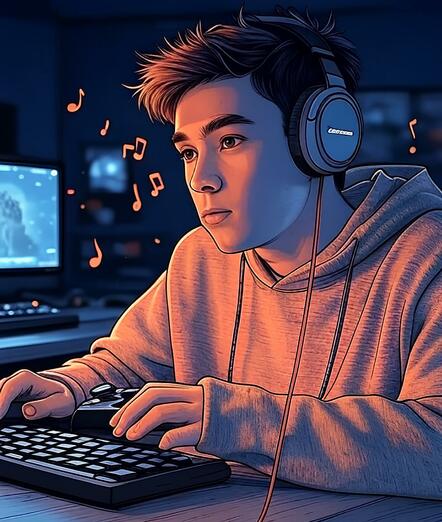New York, NY (Top40 Charts) Audio is perhaps the most overlooked element of multimedia that often does its work in the background, especially when it consists solely of a musical score. It would be a big mistake to underestimate its impact, even if it's regularly overshadowed by flashy visuals and textual communications. When you are interacting with any kind of software (including online games), music remains an important piece of the puzzle that brings something unique to the table.
The role of music in games is manifold and relies on our psychological tendencies for effect. This topic is rarely discussed, so we will try to rectify that and outline the main mechanisms that translate sound into tangible benefits for the player.
Supporting the Main Themes
If you have any experience with slots for real money and similar games, you know that each of them has a distinct theme that sets it apart from similar titles. The themes range from historical to fanciful, and include different visual elements that are merged with the gameplay and contribute to player experience in a meaningful way. Background music is typically chosen to fit with the theme, so games inspired by oriental iconography feature traditional sound associated with the Middle East, while horror-themed games are scored by spooky music. The synergy of visuals and music works like a dream and transports the player into the game world nearly instantly and without the need to make a conscious effort or perform any complex actions.
Regulating the Atmosphere
Nothing sets the mood quite like music. This principle has long been the staple of movies and online games are making good use of it too. Some games want the player to be in a lighthearted mood while interacting with on-screen content and the easiest way to accomplish this is by picking a happy tune that starts when you enter the game. In other instances, the goal is to build up tension and cause the player to be constantly on the edge, so up-tempo music with occasional bursts of high-pitched sound is a better fit. Music gives game developers a powerful tool that lets them control how the players will feel at every point in the game, and this can be skillfully applied to practically every game genre.
Setting Up Big Events
In some situations, music can also play a functional role and help to advance the gameplay. A common way to do this is to change the tune at a strategic point, i.e. just before something important happens. If a player unlocks a key event or accomplishes a goal, the music changes and clearly indicates the corresponding game feature. For first time players, this adds another pointer to help them navigate the challenges while those who have played the game before learn to react instinctively to the recognisable audio shift. The trick is to time it perfectly as not to give up too much information too early while still leaving open a brief window of opportunity to mentally prepare for the upcoming task.
Helping the Player Relax
A lot of people play online games in order to decompress after a hard day of work, so hearing cheerful and soothing music can be very helpful for them. Background music (typically a mellow instrumental) affects them without requiring active attention or interfering with the gameplay. After a while, music in their favourite games acquires a deeper meaning and becomes a trigger for letting go of the negative emotions and finding inner peace. Some players actively seek out games that feature relaxing music and always keep the sound turned on whenever they go to a gaming website, and they may not even be aware why. This is similar to cranking up a favorite radio station on the way back from work or humming a funky tune in the shower.
Increasing the 'Cool' Factor
Nobody likes to admit it, but we all gravitate towards things that we think are cool. Online games have long lost the novelty factor, so they have to search for ways to remain relevant in an environment where alternatives are plentiful and easy to find. Music can really change the perception of a game, especially if it was designed specifically for the purpose and is well matched with the other key elements. This is obviously more important to casual gamers than result-obsessed daily players, and it matters more in games that rely on luck rather than skill. Each generation has a different idea of what 'cool' means, so it can be difficult to satisfy everyone with a single musical score.
Making the Experience More Immersive
Gamers often talk about getting lost in the game in superlative terms, and this may be the main objective for a big portion of them. Music can easily block out ambient noise and take the player deeper into this magical world where anything is possible. Since it's now common to use a smartphone to play in a public setting, the need to protect from unwanted external sound is much greater than in an era when gaming was a stationary activity. This is why good headphones are a key part of every gamer's gear and why you are seeing so many people on the benches and in cafes who look completely oblivious to anything happening in their vicinity.
























